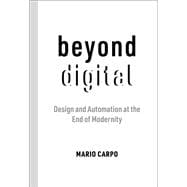
Beyond Digital Design and Automation at the End of Modernity
- ISBN13: 9780262545150
- ISBN10: 0262545152
- eBook ISBN(s): 9780262373395
- Format: Paperback
- Copyright: 2023-04-18
- Publisher: The MIT Press
-
Your order must be $35 or more to qualify for free economy shipping. Bulk sales, PO's, Marketplace items, eBooks and apparel do not qualify for this offer.








